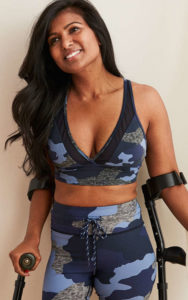Body Positivity and Brand Authenticity
Published on October 4, 2018, at 3:10 p.m.
by Gillian Castro.
Certain industries acquire certain reputations over time. These distinctions become well-defined molds that shape the people within a particular profession. For most, a defining reputation, good or bad, becomes a major part of a brand, and when the time for a rebrand comes, it is no simple task.
The fashion industry is a $1.2 trillion global industry. Achieving a rebrand that spans the industry requires a significant catalyst for change to break the mold of conventionality and move into a place of authenticity.
American Eagle’s sub-brand, Aerie, is one of many companies making the change toward authenticity in an effort to alter the face of the fashion and beauty industry. The AerieREAL campaign is an ongoing attempt that features un-retouched models familiar to the brand’s own consumer base. By featuring real Aerie customers in this campaign, the well-known fashion brand is forming an authentic name for itself as well as highlighting its stance on female empowerment and body positivity.
“As a brand, Aerie has been a leader in empowering women and celebrating inclusivity and body positivity since our launch of #AerieREAL in 2014,” said Jennifer Foyle, Aerie global brand president, in a statement quoted by AdWeek. “Our newest bra models are part of our brand’s ongoing commitment to show real, authentic and un-retouched women, who are at the core of everything that we do.”

The authenticity of Aerie comes in different shapes and sizes, featuring women of all backgrounds, skin colors and medical histories. This inclusive campaign has received a positive amount of support since its inception in 2014. The familiarity and positive self perception that women in this campaign possess impact the way fashion is portrayed in the media, as well as the brand loyalty of Aerie’s consumers.
“A number of previous studies have confirmed that people favor products with images consistent with their own self-image,” said Dr. Seung Eun Jung, registered dietitian and assistant professor of human nutrition at The University of Alabama. “If a consumer perceives a brand image or a user of a brand as similar to their own image, he/she would have a greater intention to purchase a product made by that brand over other brands. So I would say yes, I can see that more people would be willing to show loyalty to a brand that has embraced body positivity.”
The need for body positivity in the media is also believed to play a role in the movement toward authenticity in the industry as a whole.
“I do believe that we are surrounded by so much negative these days — in all contexts — and it seems to be the place we go to in so many situations and circumstances,” said Dr. Kimberly Bissell, associate dean for research at The University of Alabama College of Communication and Information Sciences. “I think it is very easy to have negative self-perception and to, in general, just not have a positive self-image. This is the case for many reasons, but largely because we are surrounded by mediated messages, especially those in social media, that show us images of ‘perfection’ that isn’t really attainable.”
In addition to creating a more positive self-image for females within the fashion industry, body positivity campaigns can also play a part in addressing the issue of eating disorders within our society.
“I think the body positive movement could create a new societal norm, which could help us develop a positive body image,” Jung said. “I think this could also benefit the many individuals who suffer from eating disorders. Seeing women of all shapes and sizes celebrated in the media could help with the acceptance and celebration of their own bodies. Campaigns that have embraced the body positivity movement can inspire us all to learn how to love our bodies.”

While the Aerie campaign does a good job of creating an authentic brand, is it enough to force a rebrand of the entire fashion industry? In an article by Jennifer Simon, a senior vice president in Edelman’s Business and Social Purpose practice, she stated that it is important to celebrate women for “what they can accomplish, not for how they look.”
Although the AerieREAL campaign is considered effective and authentic by some, campaigns such as Always’ “Like a Girl” and Nike’s “Better for It” have proven to be more successful in driving change across the beauty and fashion industries. While an industry rebrand may be impossible, a change in perception is not.
“Rebrand is a strong word. Are they rebranding the beauty and fashion industry? I don’t think so. Are they trying to shift perceptions of what is ‘normal’ or ‘socially acceptable’? Possibly,” Bissell said. “In order for this to be truly effective, you have to see it happening across companies and across media platforms.”
To successfully change brand and industry reputations, the change must be widespread and substantive, especially for an industry as large as fashion and beauty. Companies must focus on empowerment — starting with abilities rather than looks, being authentic and committing to the cause — to achieve brand loyalty. Only when an industry accomplishes these three things to the fullest extent will it be possible to achieve a change this big.




